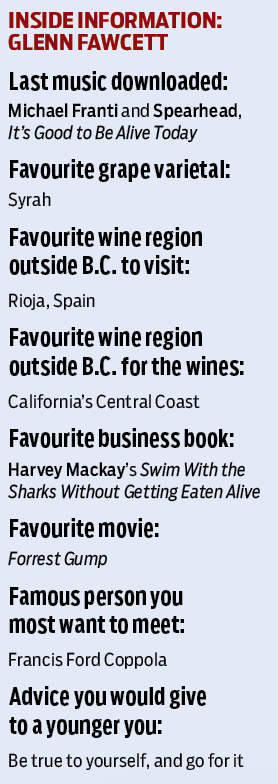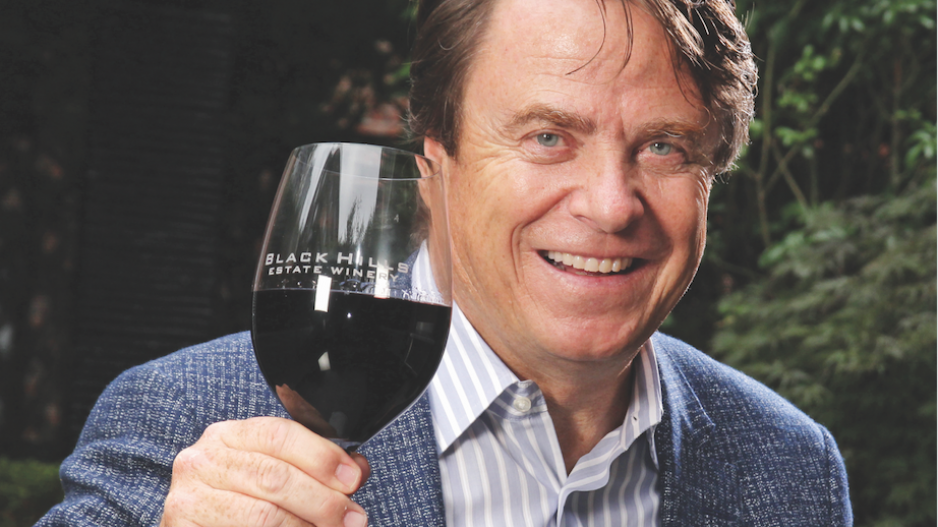Black Hills Estate Winery CEO Glenn Fawcett is impacted by regulations that allow grocery stores to sell wines, evolving rules on what regional designations can be put on labels and how effective the British Columbia Vintners Quality Alliance (BCVQA) certification is at identifying quality wine.
But if you want to connect with him, don't talk about politics. Instead, discuss fun ways to market products.
He would much rather channel energy that could be spent on political lobbying and convert it to a promotional end.
“The politics of what should be BCVQA or not, or about the new geographic regions – that holds little interest to me,” Fawcett told Business in Vancouver.
“My deep passion is creating a phenomenal wine-tourism destination in the Okanagan.”
Indeed, Fawcett has crafted a reputation as a marketing whiz full of energy, enthusiasm and ideas.
No other Okanagan winery owner thought to lure a celebrity to create a buzz around a winery’s brand.
Not only did Fawcett get Vancouver-born actor Jason Priestley to help market Black Hills but he also got Priestley to become an investor and sit on Black Hills’ board of directors.
It was Fawcett who was the driving force behind the Osoyoos Celebrity Wine Festival, which ran for three years, ending in 2012.
Priestley and other actors, such as Bruce Greenwood, as well as singer George Canyon, film producers and others helped draw entertainment media to B.C.’s main wine region.
Fawcett’s work on the project prompted Hillside Estate Winery owner and Black Hills investor Duncan McCowan to tell BIV that Fawcett is one of the best marketers he has ever met.
Changes in how the B.C. government allotted tourism spending killed the festival, Fawcett said, but he added that he was already getting a bit tired of putting so much work into the project and wanted instead to focus on his winery.
Black Hills has been known for years for producing a Bordeaux-style blend Nota Bene (Latin for note well), which is one of B.C.’s most esteemed red wines, along with Osoyoos Larose’s Le Grand Vin and Mission Hill Estate Winery’s Oculus.
Fawcett in some years has drummed up enough interest for the Nota Bene to sell out thousands of cases in less than an hour.
About 3,300 cases of Black Hills’ 12,000-case production is now Nota Bene and Fawcett has been making the rounds in Vancouver at tastings in the past week to promote the release of the wine’s 2014 vintage.
The 57-year-old was not always a wine promoter.

While completing his business degree in his hometown at the University of Calgary in the 1980s, Fawcett put his entrepreneurial passion into an array of projects. He sold beefcake calendars of the Canadian men’s ski team, produced concerts featuring Doug and the Slugs and the Payolas and launched a company called Bust Loose Holidays, which marketed spring break vacations to Mexico for Canadian university students.
“It was the travel industry that I was near and dear to,” he said.
After he graduated in 1984, he continued to operate Bust Loose and sold the venture in 1992, when he thought that the business had hit its peak.
He decided to hang out in Whistler for a year-long sabbatical but soon found himself selling time-share properties when what is now Intrawest Resorts Holdings Inc. (NYSE:SNOW) launched its Club Intrawest division.
He was also involved in the late 1990s creating Whistler’s Mountain World entertainment centre.
But in 2000, when the dot-com bubble was inflating, he did what almost every other entrepreneur was doing. He got involved with the digital revolution.
Fawcett co-founded Publications Unbound and sold e-books in PDF form, thanks to the company acquiring e-book rights to travel publications produced by Lonely Planet, Frommers, Fodors and Berlitz.
It was only after that venture was sold, in 2001, that Fawcett became acquainted with the wine sector. It started after he and wife Kym went on vacation to the Napa Valley.
“I fell in love with the wine industry on that trip,” he said.
“I thought, ‘This is amazing.’ There was great wine, everyone was happy and there were events with wine. Everything was revolving around the grape.”
Fawcett started marketing wine tours for the non-profit, wine-purchasing co-operative Opimian Society.
In 2007, while running what he called a “hobby” business, he listened to countless wine tourists who told him that they would love to own a winery but they thought it would take too much work and they did not want to lose their life savings if the venture flopped.
Bingo, he thought.
Why not create a vehicle to allow hundreds of shareholders to buy Black Hills?
The structure he devised is complicated because it has both general and limited partnerships. Fawcett owns 54% of a general partnership that runs the winery while six board directors and three others together own a 46% stake.
A limited partnership that Fawcett created also owns the winery. It has 456 units that are owned by 360 individuals. The general partnership owns 32 of the limited partnership’s units.
Profit flows first to the limited partnership, where all the partners are paid up to the value of their capital plus 30%. Any profit on top of that will eventually be split evenly with the general partnership. Getting to that level of profit will likely not happen until the winery is sold, Fawcett said.
“The general partnership doesn’t get paid any special premium until all limited partners, including our units, get paid back,” he said.
“The good thing with this structure is that we’re highly motivated to make this a long-term success.”
Limited partnership units were originally sold for $25,000 but resales, prompted by divorce or estate planning, have transacted at a “significant” premium on that price, Fawcett said.
The winery itself is profitable on what Fawcett expects to be more than $5 million in sales this year.
When his group bought the winery from two founding couples in 2007, the operation was generating $1.3 million in annual sales.
The lion’s share of sales come from the wine, although the winery sells pizza and charcuterie on its patio in the summer. Visitors also buy a range of merchandise.
“We never wanted to be a full-service food operation as we feel that would be a distraction from our core focus of providing wine tasting experiences,” Fawcett said.
“Keeping the food offering more simple allows us to do that.”
The winery is in an unusual situation in that 75% of its wine sales are direct to consumer. That’s the most profitable sales channel for any B.C. winery because a lower percentage of the retail price goes toward taxes to the British Columbia Liquor Distribution Branch.
About 25% of Black Hills’ sales are at the winery while 25% are to wine-club members and a further 25% are to those on mailing lists, Fawcett said.
Remaining sales are to restaurants, through stores in B.C. and to liquor boards in Alberta and Ontario.
Outside work, Fawcett skis, cycles, goes to concerts and travels to wine regions around the world. He and Kym have an 18-year-old daughter and a 15-year-old son. •




